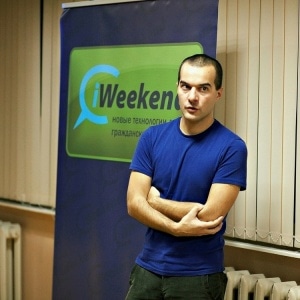The “RosYama” [ru] [literally “Russian Pothole”] project is a method of monitoring the state of the roads and their compliance with latest government standards. Anyone who notices a roadway that fails to meet these standards can use RosYama's service.
The coordinator of RosYama, Fyodor Ezeev, told Evgeny Voropai of Greenhouses of Social Technologies how he has long since stopped seeing the borders between the online and offline worlds, and why “targeted” projects are more effective than universal ones.

Fyodor Yezeev. Photo supplied by owner.
Fyodor Ezeev: I think that RosYama has three components which lead to its successes. First of all, the relevancy of the theme — potholes on the roads genuinely bother many people. Secondly, the influence of [prominent opposition blogger and activist] Navalny meant that a large amount of people found out about the project from the very start. Thirdly, RosYama differentiates itself from similar road projects by assisting users with composition of complaints and by taking on the legal aspects of the task.
Evgeny Voropai: How has the behavior of users changed since RosYama was first established.
F.E.: Our audience has decreased by about two or three times, but the number of registered potholes has increased at about the same rate. Which means that every visitor now registers about five times as many potholes as before. People have stopped visiting the site out of curiosity but there are more of those who use it as intended.
E.V.: RosYama is an automated service of submitting complaints with a significant number of active users. Tell us what the project team does in Moscow and the regions.
F.E.: RosYama isn't an automated service for forwarding complaints. User complaints must be submitted independently. The RosYama team works on the site and advises project users.
E.V.: When a project works on a model of cooperation that is “The user is in charge”, it is important to soberly appraise the active participation of your audience. What other indicators can tell you that your project is effective and working?
F.E.: The only indicator of the viability of any action is the presence or absence of tangible results. RosYama's tangible results are more than 8,500 fixed potholes.
E.V.: You've written on your blog that after the [recently organized opposition] debates, the number of visitors grew by 58%. Would you say that public management of internet projects is more effective than traditional management?
F.E.: The the effectiveness of any marketing, as a rule, is very short-term. I believe RosYama needs to pay more attention to the development of possibilities for our users and ease of use. These actions bring good long-term results.
E.V.: The blogosphere has actively responded to your participation in the elections of the opposition's Coordinating Council. Were there worries that this might negatively affect RosYama?
F.E.: No, there were no such worries.
E.V.: “Seven candidates for seven projects” [a voting block at Coordinating Council elections] is represented by the managers and coordinators of internet projects. If they were to start working in the offline world, how would this affect their online activities?
F.E.: I've stopped seeing the boundaries between the online and offline worlds a long time ago. The internet is only another means of transmitting information, a method of connecting people. Just like a phone, for example. One person uses a telephone to pointlessly yap for hours, while another orders his broker to sell a portfolio of shares worth millions of dollars.
E.V.: Before “RosYama” we already had [anti-corruption website] “RosPil”, after that “RosUznik” [a legal aid fund for arrested opposition figures] appeared and then [election monitoring website] “RosVybory”. Have you tracked the migration of a loyal audience from one project to another?
F.E.: I haven't. I'd suppose that it's zero or practically zero. If someone is interested in government tenders, he won't stop being interested in them because of RosUznik.
E.V.: In your posts on LiveJournal, you point out that the audience often doesn't see the connection between their immediate problems and free elections. But at the same time all these “Ros-projects” are very targeted and don't allow the audience to see these issues as part of a complex whole. Has there been any plan to integrate all these projects into one, but with larger scope?
F.E.: I believe that our projects achieve their success in large thanks to their “targeted-ness”. The idea “do a little, but well” works better than the idea “do a lot, but badly”. As for the link between the immediate problems of citizens and free elections — its participation in a project like RosYama that allows them not only to see, but to feel this connection, practically touch it.
E.V.: You've worked in a large internet company, then you began the civic project RosYama. Did it change your approach to work and task performance?
F.E.: I try to only take on tasks which I'm actually interested in solving. Other superficial factors have practically no meaning for me.







